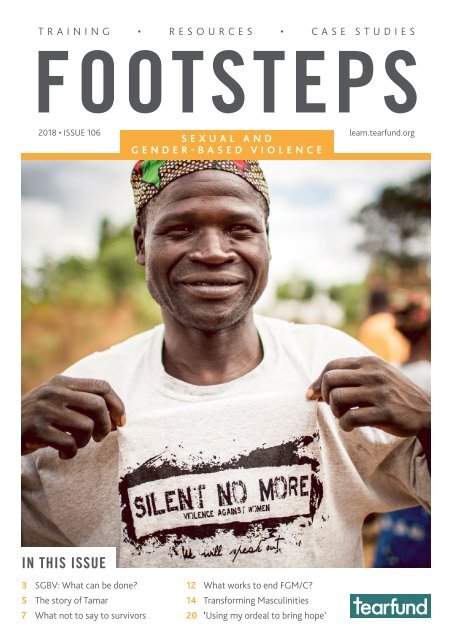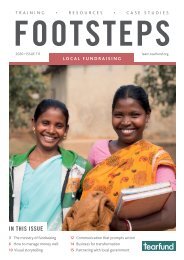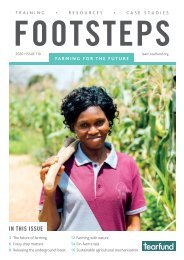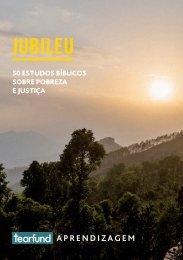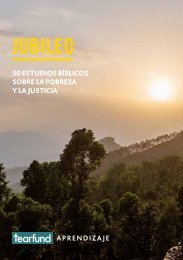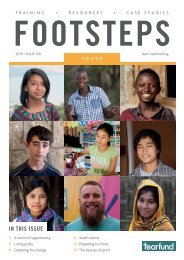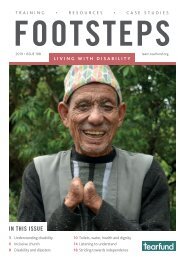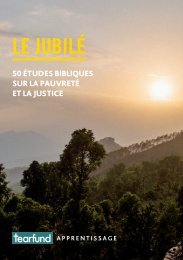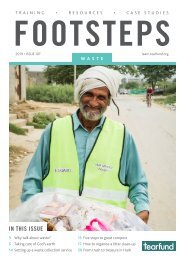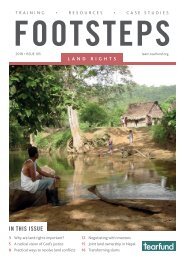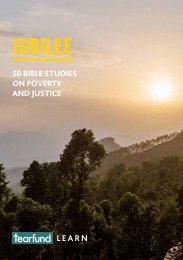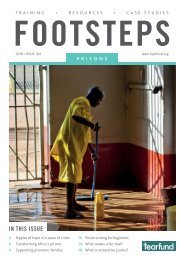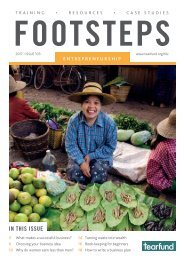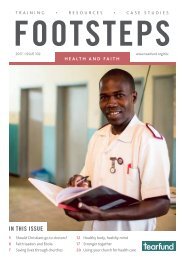Footsteps 106: Sexual and gender-based violence
Create successful ePaper yourself
Turn your PDF publications into a flip-book with our unique Google optimized e-Paper software.
TRAINING • RESOURCES • CASE STUDIES<br />
FOOTSTEPS<br />
2018 • ISSUE <strong>106</strong><br />
SEXUAL AND<br />
GENDER-BASED VIOLENCE<br />
learn.tearfund.org<br />
IN THIS ISSUE<br />
3 SGBV: What can be done?<br />
5 The story of Tamar<br />
7 What not to say to survivors<br />
12 What works to end FGM/C?<br />
14 Transforming Masculinities<br />
20 ‘Using my ordeal to bring hope’
WARNING<br />
This edition is on the topic of sexual <strong>and</strong> <strong>gender</strong><strong>based</strong><br />
<strong>violence</strong> (SGBV), <strong>and</strong> the content may be<br />
distressing to some readers. We have included line<br />
drawings showing the different types of female genital<br />
mutilation/cutting (FGM/C) on pages 10–11. These<br />
are not intended to cause offence, but rather to help<br />
readers underst<strong>and</strong> this important issue.<br />
FEATURES<br />
3 <strong>Sexual</strong> <strong>and</strong> <strong>gender</strong>-<strong>based</strong> <strong>violence</strong>:<br />
what can be done?<br />
6 Creating a survivor movement<br />
7 What not to say to survivors<br />
8 Breaking the economic chains<br />
of SGBV<br />
12 What works to end FGM/C?<br />
14 Transforming Masculinities:<br />
Tearfund’s approach to ending SGBV<br />
15 GROUP ACTIVITY: Jesus, our<br />
role model<br />
16 Community Action Groups<br />
REGULARS<br />
5 BIBLE STUDY: The story of Tamar<br />
18 RESOURCES<br />
19 COMMUNITY<br />
FOOTSTEPS<br />
SEXUAL AND GENDER-BASED VIOLENCE<br />
This is the third <strong>and</strong> final part of our <strong>Footsteps</strong> series <strong>based</strong> on<br />
the biblical idea of jubilee. In the Old Testament, the jubilee year<br />
was intended for the restoration of the Israelites’ relationships<br />
with God, one another <strong>and</strong> the l<strong>and</strong>. In this edition, we look at a<br />
topic where restoration, justice <strong>and</strong> healing are urgently needed:<br />
sexual <strong>and</strong> <strong>gender</strong>-<strong>based</strong> <strong>violence</strong> (SGBV). This is one of the most<br />
damaging <strong>and</strong> widespread problems facing the world today.<br />
But there is hope. I recently visited a church in the Democratic<br />
Republic of Congo (DRC) that is part of an exciting initiative aimed<br />
at preventing SGBV. The church is running Tearfund’s Transforming<br />
Masculinities programme (see pages 14–15), looking at healthy<br />
ways men <strong>and</strong> women can relate to each other in the knowledge<br />
that we are all equal, made in the image of God.<br />
The church’s pastors reported that <strong>violence</strong> between couples in<br />
their congregation had decreased since the programme started.<br />
I met with a husb<strong>and</strong> <strong>and</strong> wife who were full of joy at the ways<br />
their relationship had been transformed. Participants had invited<br />
their friends <strong>and</strong> neighbours to take part, <strong>and</strong> the message was<br />
spreading fast.<br />
There is much we can do both to prevent <strong>and</strong> respond to SGBV<br />
in our communities. This edition includes inspiring ideas from<br />
Paz y Esperanza in Latin America, who are empowering women<br />
economically to make them less vulnerable to SGBV (pages 8–9).<br />
We feature practical ways of helping survivors of SGBV on their<br />
journey to healing (pages 6–7 <strong>and</strong> 16). And we look at what<br />
really works to end female genital mutilation/cutting, which we<br />
at Tearfund consider to be a type of sexual <strong>violence</strong> committed<br />
against women (pages 10–13).<br />
I will end with some words from Sylvie, an inspiring survivor<br />
of SGBV from DRC: ‘Whatever you are going through, know<br />
that God is with you. Whatever happens, do not lose hope. The<br />
suffering is not the end of our lives. There are better things that<br />
God is preparing for us. I believe in that God.’<br />
20 INTERVIEW: Using my ordeal to<br />
bring hope<br />
TAKE AND USE<br />
Zoe Murton – Editor<br />
10 TEACHING TOOL: Underst<strong>and</strong>ing<br />
female genital mutilation/cutting<br />
PS Because of the sensitive topics covered in this edition, we<br />
have not included our normal children’s page.<br />
17 POSTER: What to do if you have<br />
been raped Cover shows a man in Malawi taking part in the Silent no more campaign against<br />
SGBV in 2012. Photo: Chris Boyd/Tearfund<br />
2 FOOTSTEPS <strong>106</strong>
y Veena O’Sullivan<br />
SEXUAL AND GENDER-BASED<br />
VIOLENCE: WHAT CAN BE DONE?<br />
<strong>Sexual</strong> <strong>and</strong> <strong>gender</strong>-<strong>based</strong> <strong>violence</strong><br />
(SGBV) threatens the human rights,<br />
safety <strong>and</strong> dignity of millions of affected<br />
individuals. It also has negative effects<br />
on the public health <strong>and</strong> security of the<br />
communities in which it happens.<br />
THE PROBLEM<br />
SGBV is <strong>violence</strong> directed against<br />
anyone <strong>based</strong> on their sex or <strong>gender</strong>,<br />
where sex refers to the biological<br />
differences between males <strong>and</strong> females<br />
<strong>and</strong> <strong>gender</strong> to society’s ideas about what<br />
it means to behave as a man or woman.<br />
It includes physical, sexual, verbal <strong>and</strong><br />
psychological <strong>violence</strong>.<br />
SGBV affects one out of every three<br />
women around the world, while one<br />
in every 33 men suffers SGBV. It is<br />
therefore closely connected to <strong>violence</strong><br />
against women. Unequal power<br />
relationships <strong>and</strong> differences in social<br />
st<strong>and</strong>ing between men <strong>and</strong> women are<br />
the main reason for SGBV.<br />
Many people associate sexual <strong>violence</strong><br />
with war <strong>and</strong> armed conflict. <strong>Sexual</strong><br />
<strong>violence</strong> in conflict is a key challenge,<br />
<strong>and</strong> we need to ensure that all efforts<br />
are made to prevent this brutality. This<br />
includes bringing perpetrators to justice,<br />
<strong>and</strong> developing programmes to respond<br />
to SGBV from the outset. But while the<br />
extent of sexual <strong>violence</strong> during war<br />
<strong>and</strong> conflict is heightened, we must not<br />
forget that it happens in peacetime too<br />
– in homes, schools, places of work <strong>and</strong><br />
the wider community. It is important<br />
to know that the majority of <strong>violence</strong><br />
against women <strong>and</strong> girls is perpetrated<br />
by an intimate partner– someone<br />
they are or have been in a romantic<br />
relationship with.<br />
WHAT CAN BE DONE TO<br />
PREVENT SGBV?<br />
SGBV is a result of the problem <strong>and</strong><br />
pain of broken relationships. Prevention<br />
is possible, but it requires a change in<br />
hearts, minds <strong>and</strong> behaviours.<br />
Silence is a barrier to ending SGBV. We<br />
need to be able to speak out about it<br />
<strong>and</strong> underst<strong>and</strong> that stigma <strong>and</strong> lack of<br />
support keep survivors silent, which in<br />
turn increases their vulnerability. In order<br />
to create safe communities, we need<br />
to work together across the education,<br />
health, social <strong>and</strong> justice sectors. This<br />
must include leadership at all levels.<br />
When survivors are empowered <strong>and</strong><br />
organised, they too can be a powerful<br />
force for change.<br />
We must also ensure that our<br />
governments st<strong>and</strong> against <strong>violence</strong><br />
through signing up to key international<br />
laws, developing systems that support<br />
survivors <strong>and</strong> ensuring that perpetrators<br />
do not escape punishment. Laws need<br />
to be backed up by adequate processes<br />
that can bring them into practice. Our<br />
leaders themselves should be role<br />
models in the way they respect <strong>and</strong><br />
treat women.<br />
WHAT IS THE ROLE OF FAITH<br />
COMMUNITIES?<br />
Empowering women economically can help reduce their vulnerability to SGBV. Photo: Tom Price/Tearfund<br />
Faith communities have a vital <strong>and</strong> urgent<br />
role to play both in the prevention of <strong>and</strong><br />
response to SGBV. To prevent SGBV, we<br />
need to change harmful social norms – the<br />
unwritten rules that shape people’s values,<br />
attitudes <strong>and</strong> behaviours. Faith groups<br />
have a considerable influence on social<br />
norms <strong>and</strong> traditional practices. They are<br />
also often the ones providing education<br />
<strong>and</strong> health services in local communities,<br />
<strong>and</strong> can actively seek ways to reach out to<br />
survivors of SGBV.<br />
The survivors we have listened to have<br />
always asked for the church <strong>and</strong> its<br />
leadership to speak out <strong>and</strong> to provide<br />
care <strong>and</strong> compassion. Church leaders<br />
need to underst<strong>and</strong> that SGBV happens<br />
FOOTSTEPS <strong>106</strong><br />
3
in the church, too. They should st<strong>and</strong> up<br />
for the most vulnerable, ending stigma<br />
<strong>and</strong> discrimination <strong>and</strong> championing<br />
survivors’ need for support <strong>and</strong> justice.<br />
There are many practical things that<br />
local churches (<strong>and</strong> other organisations)<br />
can do:<br />
••<br />
Become educated about SGBV<br />
<strong>and</strong> speak about it openly in<br />
sermons <strong>and</strong> meetings, addressing<br />
harmful ideas about <strong>gender</strong> from a<br />
theological <strong>and</strong> cultural perspective.<br />
••<br />
Provide services such as counselling<br />
<strong>and</strong> health care, or accompany<br />
survivors to access these services.<br />
••<br />
Create safe spaces for women to speak<br />
openly about SGBV. Support groups for<br />
women can be a powerful approach.<br />
••<br />
Encourage members of the local<br />
community to form an action group<br />
that will provide seamless support to<br />
survivors (see page 16).<br />
••<br />
Create emergency funds to support<br />
women in crisis.<br />
••<br />
Invest in the empowerment of<br />
women, including income generation<br />
activities, so they do not feel trapped<br />
into living with perpetrators of SGBV for<br />
the sake of basic needs.<br />
••<br />
Mobilise men to be champions for<br />
the rights of women <strong>and</strong> girls.<br />
••<br />
Advocate with local authorities to<br />
make sure they too become safe spaces<br />
for survivors to find compassion, care<br />
<strong>and</strong> justice.<br />
WHAT CAN INDIVIDUALS DO?<br />
As individuals, it is important that we do<br />
not feel powerless to do anything about<br />
SGBV. There are many things that we<br />
can do both to prevent <strong>and</strong> respond to<br />
the problem:<br />
••<br />
Underst<strong>and</strong> that every community,<br />
whether rich or poor, is vulnerable<br />
to SGBV.<br />
••<br />
Start with the young. Ensure you<br />
treat both boys <strong>and</strong> girls as being of<br />
equal value, giving them equal access to<br />
education <strong>and</strong> other opportunities.<br />
••<br />
Make <strong>violence</strong> unacceptable! Let<br />
people know that you st<strong>and</strong> against<br />
<strong>violence</strong> against women <strong>and</strong> girls.<br />
••<br />
Encourage both men <strong>and</strong> women to<br />
have ongoing discussions about mutual<br />
It is important to involve men <strong>and</strong> boys in<br />
preventing SGBV. Photo: Cally Spittle/Tearfund<br />
respect. Ensure people recognise that it<br />
is important to involve men <strong>and</strong> boys.<br />
••<br />
Make sure people know where to<br />
go to seek help.<br />
SGBV is preventable. We all have to<br />
play our part in ending it. We can start<br />
by breaking our silence, beginning<br />
conversations in our homes, places of<br />
work <strong>and</strong> worship. We need to model<br />
the change we want to see <strong>and</strong> inspire<br />
others to do the same.<br />
Veena O’Sullivan leads Tearfund’s work<br />
on SGBV <strong>and</strong> peacebuilding.<br />
Web: www.tearfund.org/sexual<strong>violence</strong><br />
Email: veena.osullivan@tearfund.org<br />
WHAT CAUSES VIOLENCE AGAINST WOMEN?<br />
A man may offer many excuses<br />
for hurting a woman – that he was<br />
drunk, that he lost control or that<br />
she ‘deserved it’. But a man chooses<br />
to use <strong>violence</strong> because it is a way<br />
he can get what he needs or what he<br />
feels is rightfully his as a man. Power<br />
<strong>and</strong> control are key reasons for<br />
<strong>violence</strong> against women. Violent or<br />
abusive relationships often happen<br />
when one person has more power<br />
over the other.<br />
There are many different ways that<br />
a man tries to gain power over a<br />
woman. Physical <strong>violence</strong> (beating,<br />
slapping, kicking etc) is only one of<br />
them. Other types of <strong>violence</strong> against<br />
women include:<br />
Emotional abuse The man insults the<br />
woman, puts her down or makes her<br />
think she is going crazy.<br />
<strong>Sexual</strong> abuse The man makes the<br />
woman do sexual things against her<br />
will, or physically attacks the sexual<br />
parts of her body. He treats her like<br />
an object.<br />
Controlling money The man tries to<br />
keep the woman from getting a job<br />
or making her own money. He makes<br />
her ask him for any money she needs.<br />
Or he may force her to work <strong>and</strong> then<br />
take the money she earns.<br />
Isolation The man controls everything<br />
the woman does – who she sees <strong>and</strong><br />
talks to, <strong>and</strong> where she goes.<br />
Making threats The man uses a look,<br />
action or tone of voice, or makes<br />
threats, that make the woman feel<br />
afraid that he will hurt her.<br />
Using children The man uses the<br />
children to make the woman feel<br />
guilty, or to hurt her.<br />
Adapted from Where women have no<br />
doctor by Arlene August Burns. Visit<br />
www.hesperian.org to buy a copy or<br />
download the book free of charge.<br />
4 FOOTSTEPS <strong>106</strong>
BIBLE STUDY<br />
THE STORY OF TAMAR<br />
<strong>Sexual</strong> <strong>violence</strong> is not just something that<br />
happens in society today. It has happened<br />
throughout history. The story of Tamar<br />
illustrates a chain of events that leads<br />
to a devastating act: the rape of Tamar.<br />
This Bible study can be used as a tool to<br />
engage churches <strong>and</strong> communities with<br />
the issue of sexual <strong>violence</strong>, breaking the<br />
silence that often surrounds this subject.<br />
Read 2 Samuel 13:1–22<br />
The story of Tamar is a clear account<br />
of a planned act of sexual <strong>violence</strong><br />
taking place in the house of David. The<br />
perpetrator, a half-brother who is full of<br />
lust towards his half-sister Tamar, admits<br />
to his passion for Tamar <strong>and</strong> is advised<br />
to create a story that would make it easy<br />
for him to have access to her.<br />
The sexual <strong>violence</strong> that results has<br />
a severe effect on Tamar: she tears<br />
her dress <strong>and</strong> covers herself with<br />
ashes as a symbol of mourning that<br />
she has been violated. This story is a<br />
reminder that sexual <strong>violence</strong> is an<br />
abuse of human rights. Together, in<br />
partnership with all survivors of sexual<br />
<strong>violence</strong>, we need to speak out against<br />
it <strong>and</strong> st<strong>and</strong> firm. We must join h<strong>and</strong>s<br />
in prayer <strong>and</strong> action for justice <strong>and</strong><br />
restoration of broken relationships.<br />
DISCUSSION<br />
In small groups, share with each other<br />
what you think the Bible passage is<br />
about. Then as a larger group, discuss<br />
the following questions:<br />
••<br />
Who are the characters in this story<br />
<strong>and</strong> what do we know about them?<br />
••<br />
What is the role of each of the male<br />
characters in the rape of Tamar?<br />
••<br />
What does Tamar say <strong>and</strong> do? Why<br />
does she act in that way?<br />
••<br />
What opportunities were there during<br />
this story for sexual abuse to have<br />
been avoided?<br />
••<br />
Tamar spoke out against her abuse both<br />
before <strong>and</strong> after it happened. What<br />
was the response to this? What is the<br />
response to women who speak out in<br />
our culture?<br />
WHAT CAN WE LEARN FROM<br />
THIS PASSAGE?<br />
Amnon abused his power <strong>and</strong> authority<br />
to get what he wanted, despite the harm<br />
done to Tamar.<br />
The silence of those involved in this<br />
story is shameful. Christians should not<br />
stay silent within our society if they know<br />
that abuse is taking place, whatever the<br />
personal cost to them.<br />
Tamar’s role in the household made<br />
her vulnerable: she could not refuse to<br />
serve or cook for this man. Young people,<br />
especially girls, are very vulnerable to<br />
sexual <strong>violence</strong>. We need to ensure they<br />
are educated about the risks from a<br />
young age <strong>and</strong> that effective protection<br />
is provided for them within our own<br />
families <strong>and</strong> communities.<br />
<strong>Sexual</strong> <strong>violence</strong> can take place<br />
anywhere, even in Christian homes <strong>and</strong><br />
churches. (David was a man of God, <strong>and</strong><br />
yet sexual <strong>violence</strong> occurred in his home.)<br />
It is important to create more awareness<br />
that survivors are NOT to blame for the<br />
<strong>violence</strong>.<br />
PRAYER POINTS<br />
Pray for healing of the pain <strong>and</strong><br />
suffering caused by sexual <strong>violence</strong><br />
(physical, mental <strong>and</strong> emotional).<br />
Pray for the protection of girls<br />
like Tamar who are vulnerable to<br />
sexual <strong>violence</strong>.<br />
Pray for caring <strong>and</strong> godly men <strong>and</strong><br />
women who will speak out against<br />
sexual <strong>violence</strong> <strong>and</strong> seek to protect<br />
the most vulnerable people.<br />
Adapted from H<strong>and</strong> in h<strong>and</strong>: Bible studies<br />
to transform our response to sexual<br />
<strong>violence</strong>. See Resources page for details.<br />
FOOTSTEPS <strong>106</strong><br />
5
y Solange Mukamana<br />
CREATING A SURVIVOR MOVEMENT<br />
healing. This is a three-day workshop<br />
where women have the chance to tell<br />
their stories <strong>and</strong> share their pain through<br />
creative expression. Although it is only<br />
the start of the healing process, it made<br />
a big difference to them.<br />
Survivors of SGBV often keep silent about their pain. Photo: Mark Lang/Tearfund<br />
But after they had spoken about their<br />
pain, then what? They needed ongoing<br />
support. We set up a place where<br />
they could meet together weekly in<br />
their communities. These follow-up<br />
groups often use a manual called Out<br />
of the shadows, into the light, which<br />
covers forgiveness <strong>and</strong> other topics.<br />
Forgiveness can never be forced, but we<br />
find that it is needed in order to ensure<br />
healing is taking place.<br />
Survivors of sexual <strong>and</strong> <strong>gender</strong>-<strong>based</strong><br />
<strong>violence</strong> (SGBV) often keep silent<br />
about their ordeal, which adds to their<br />
sense of isolation. Reasons for not<br />
speaking out may include threats from<br />
the perpetrators, fear of stigma <strong>and</strong><br />
discrimination, <strong>and</strong> a lack of hope that<br />
anyone could help them.<br />
Survivors face damage to every area of<br />
their lives. They may experience:<br />
••<br />
physical health problems<br />
••<br />
mental health conditions such as<br />
depression <strong>and</strong> anxiety<br />
••<br />
emotional pain<br />
••<br />
problems with sex <strong>and</strong> intimacy<br />
••<br />
substance addiction<br />
••<br />
failure to pursue a career (eg dropping<br />
out of school)<br />
••<br />
family disintegration (eg in the case<br />
of rape by a relative).<br />
Support groups allow survivors to speak<br />
about their pain in an atmosphere of<br />
acceptance, where they can begin the<br />
process of healing.<br />
STARTING SUPPORT GROUPS<br />
In South Africa, Tearfund <strong>and</strong> its partners<br />
began taking small groups of survivors<br />
through a programme called Journey to<br />
IMPROVING LIVELIHOODS<br />
It is very hard to sustain healing without<br />
looking into other areas of individuals’<br />
lives. Many of the women were struggling<br />
to put food on their tables. We helped<br />
them form savings-<strong>and</strong>-loans groups,<br />
which allowed them to take loans to start<br />
small businesses. We also helped them<br />
learn business skills <strong>and</strong> think about how<br />
they could continue their education.<br />
TRAINING CHAMPIONS<br />
As more support groups formed, we<br />
realised we needed more people to<br />
help run them. We selected survivors<br />
TIPS FOR STARTING A SUPPORT GROUP<br />
by Adrienne Blomberg<br />
You do not have to do it the same way<br />
that we have! But using a manual<br />
such as Journey to healing can be<br />
helpful. It is also useful to do some<br />
training in facilitation skills <strong>and</strong><br />
pastoral care, <strong>and</strong> to have a sound<br />
knowledge of SGBV issues.<br />
1. Create a place of safety, where the<br />
principles of trust <strong>and</strong> confidentiality<br />
are laid before anything else.<br />
2. Ensure meetings are easily<br />
accessible. Can they be reached<br />
by public transport?<br />
3. Make sure you can offer ongoing<br />
support. If you offer an initial<br />
workshop, ensure there are support<br />
groups that the women can<br />
progress to.<br />
4. Take a holistic approach. Think<br />
about ways of meeting other needs<br />
the survivors may have, such as<br />
forming a savings-<strong>and</strong>-loans group.<br />
If you are interested in using Journey<br />
to healing or our other resources,<br />
contact Solange Mukamana at<br />
solange.mukamana@tearfund.org<br />
6 FOOTSTEPS <strong>106</strong>
y Adrienne Blomberg<br />
WHAT NOT TO SAY<br />
TO SURVIVORS<br />
to become what we call Champions,<br />
<strong>and</strong> trained them in social work skills,<br />
administration, conflict management,<br />
advocacy <strong>and</strong> lay counselling. They have<br />
become such strong leaders, <strong>and</strong> help to<br />
ensure the movement is sustainable.<br />
SURVIVORS CHANGING SOCIETY<br />
We find that each group sees the needs in<br />
its own community <strong>and</strong> comes up with an<br />
activity to help in some way. For example,<br />
in one group there were many women who<br />
had been raped at an early age while their<br />
parents were out at work. They realised<br />
that a lot of children in their community<br />
were similarly vulnerable, so they set up a<br />
homework club, preventing those children<br />
from having to be at home alone.<br />
Tearfund won a prize at the Charity Awards<br />
2018 for its work with survivors in South<br />
Africa. We have also started survivor<br />
movements in Burundi, Chad, DRC, Liberia,<br />
Mali, Myanmar <strong>and</strong> Nigeria. We are now<br />
planning to scale up our work <strong>and</strong> mobilise<br />
a global movement of survivors.<br />
Solange Mukamana works for Tearfund<br />
in South Africa. For information or<br />
advice on starting survivor support<br />
groups, please contact her on<br />
solange.mukamana@tearfund.org<br />
Wrong words can be like knives in the<br />
heart for survivors of SGBV.<br />
When we are talking with women who<br />
have suffered abuse, we need to be<br />
a safe person who will not judge. We<br />
should be wholeheartedly available<br />
to listen to them <strong>and</strong> support them.<br />
Wrong words can be like knives in the<br />
heart, making survivors feel even more<br />
hopeless <strong>and</strong> alone. These women<br />
need to know we are there for them.<br />
Here are some deeply unhelpful<br />
things that are often said to survivors:<br />
‘What were you wearing?’<br />
This question is totally irrelevant.<br />
What does it matter what she wore?<br />
Policewomen in uniform have been<br />
assaulted. The US Department of<br />
Justice has confirmed that there is<br />
no connection between clothing <strong>and</strong><br />
sexual assault. Questions like this imply<br />
that the survivor was partly at fault,<br />
when in fact the only person to blame is<br />
the one who carried out the abuse.<br />
‘Why did you not run away<br />
or shout out?’ or ‘What were<br />
you doing there?’<br />
Again, these comments suggest the<br />
survivor was somehow at fault. Abuse<br />
occurs under all circumstances. Often<br />
during an assault, the person being<br />
attacked is in a state of shock. Ask<br />
yourself: Wouldn’t the person have<br />
run, shouted or avoided the place if it<br />
had been possible? How easy is it to do<br />
these things when you are vulnerable?<br />
How can you avoid a place where you<br />
receive much-needed food or pay?<br />
‘Was it really that bad?’ or ‘You<br />
are lucky it was not as bad as<br />
what happened to so-<strong>and</strong>-so!’<br />
Of course it was bad. We do not need<br />
to grade it. ‘Lucky’ is never a word to<br />
use when it comes to abuse. What<br />
happened changed a life; we must not<br />
compare it with others’ experiences.<br />
‘Why are you crying? It is over<br />
now,’ or ‘Just calm down.’<br />
These words are so unhelpful. Crying<br />
shows there are still emotions, which<br />
is a healthy sign. God created us with<br />
emotions. Pain, confusion, anger <strong>and</strong><br />
many other feelings need to be expressed<br />
in order for healing to take place. Maybe<br />
the people speaking these words cannot<br />
deal with the emotions being expressed.<br />
‘Have you forgiven him?’<br />
or ‘Are you praying for him?’<br />
As Christians, we can be hurtfully<br />
legalistic. While forgiveness is an<br />
important part of the healing process,<br />
it takes time. Never force survivors to<br />
pray for their perpetrators; instead,<br />
pray for <strong>and</strong> with the survivors. Allow<br />
them to be angry or even to wish for<br />
the perpetrator’s death. The time will<br />
come when forgiveness can be given,<br />
one step at a time.<br />
‘It’s all part of God’s plan’ or<br />
‘God disciplines those he loves’<br />
These comments are very cruel in this<br />
context. God is a loving Father who<br />
only has good plans for us. Similar<br />
remarks may be made in Buddhist<br />
settings, such as, ‘This must be your<br />
karma.’ Always reassure the woman<br />
that abuse is never part of God’s plan<br />
<strong>and</strong> that no one deserves it.<br />
Let us be there for our hurting sisters<br />
with the right attitude, being nonjudgemental<br />
<strong>and</strong> available. Learn from<br />
Proverbs 16:24: ‘Gracious words are<br />
a honeycomb, sweet to the soul <strong>and</strong><br />
healing to the bones.’<br />
Adrienne Blomberg is a consultant<br />
working for Tearfund in Liberia to<br />
support survivors of SGBV.<br />
Email: ablombergwork@gmail.com<br />
FOOTSTEPS <strong>106</strong><br />
7
y J Mark Bowers<br />
BREAKING THE ECONOMIC<br />
CHAINS OF SGBV<br />
Maribel* never imagined a $30 loan<br />
would make her a slave…<br />
When disease struck her husb<strong>and</strong> several<br />
years ago, Maribel sold their l<strong>and</strong> to pay<br />
the medical debts. She then sold their<br />
cattle, <strong>and</strong> everything else they owned,<br />
looking for a cure. But it was all in vain. Her<br />
husb<strong>and</strong> eventually died in their one-room<br />
house on the outskirts of La Paz, Bolivia.<br />
With no money <strong>and</strong> desperate for<br />
work, Maribel <strong>and</strong> her daughter took a<br />
cleaning job in Potosí, a distant province.<br />
The work was a long way from their<br />
community, but the employer provided<br />
accommodation <strong>and</strong> gave Maribel a loan<br />
of $30 for her moving expenses. After<br />
working there for just a week, Maribel<br />
realised the truth: on the wage she was<br />
receiving, she would never pay back this<br />
debt. Her employer owned her.<br />
He became increasingly violent <strong>and</strong><br />
abusive, paying Maribel just enough<br />
to allow her to eat <strong>and</strong> make her loan<br />
payments. When angry, her boss <strong>and</strong><br />
his gangsters tortured her <strong>and</strong> the other<br />
female workers, burning them with<br />
cigarettes. When they were drunk, they<br />
often assaulted <strong>and</strong> raped the women.<br />
Having paid off the local police long<br />
ago, these men had no fear of justice –<br />
<strong>and</strong> the women had nowhere to go to<br />
plead for safety.<br />
Maribel was trapped.<br />
Sadly, Maribel’s story is not a bizarre,<br />
one-off tragedy, but a daily reality for<br />
so many women around the world.<br />
Powerlessness <strong>and</strong> crippling fear keep<br />
people such as Maribel silent – <strong>and</strong><br />
often hidden in plain sight. Today, more<br />
than 40 million people around the<br />
world are trapped in bondage through<br />
slave labour <strong>and</strong> forced marriage. Those<br />
who are materially poor, especially<br />
women, are highly vulnerable to this<br />
kind of exploitation, which often leads<br />
to <strong>violence</strong>.<br />
What can you do to prevent sexual<br />
<strong>and</strong> <strong>gender</strong>-<strong>based</strong> <strong>violence</strong> in your<br />
community? Below are several ideas<br />
inspired by the work of Paz y Esperanza,<br />
a human rights organisation that<br />
works alongside local governments in<br />
Latin America.<br />
ENGAGING LOCAL GOVERNMENT<br />
To protect them from <strong>violence</strong>, the<br />
world’s poorest people need public justice<br />
systems – police, magistrates, courts<br />
– that work for them. If there are no<br />
consequences for oppressive employers,<br />
how can women such as Maribel benefit<br />
from the hospitals, schools, wells, latrines<br />
<strong>and</strong> microfinance banks we might build?<br />
If nothing protects the poorest women<br />
from <strong>violence</strong> <strong>and</strong> slavery, how can they<br />
save <strong>and</strong> invest, climbing out of poverty?<br />
Paz y Esperanza addresses this problem at<br />
the root, equipping local citizens as well<br />
as their public justice systems.<br />
HOSTING AWARENESS<br />
WORKSHOPS<br />
In many rural communities, male<br />
chauvinism <strong>and</strong> <strong>violence</strong> have become<br />
an accepted reality. To challenge these<br />
norms, Paz y Esperanza hosts awareness<br />
workshops in churches <strong>and</strong> community<br />
centres. The goals are to help women<br />
to increase their resilience <strong>and</strong> improve<br />
their income to make them less<br />
vulnerable to <strong>violence</strong>.<br />
These workshops include discussions<br />
on everything from self-esteem <strong>and</strong><br />
communication skills to healthy<br />
approaches for disciplining children.<br />
Women are trained to speak publicly in<br />
their local community, using a megaphone<br />
to relay these messages about healthy<br />
family culture to their neighbours. Once<br />
a group of 25 empowered women has<br />
been formed, Paz y Esperanza trains <strong>and</strong><br />
organises them to begin an advocacy or<br />
entrepreneurship project.<br />
INCREASING WOMEN’S<br />
PARTICIPATION<br />
In Peru, local governments hold<br />
an annual ‘participatory budget<br />
consultation’, allowing citizens to state<br />
what they want funded. In the region of<br />
Ayacucho, traditionally this consultation<br />
is dominated by men proposing plans for<br />
infrastructure <strong>and</strong> irrigation.<br />
Girls taking part in an awareness-raising campaign aimed at reducing SGBV. The sign says, ‘You are kind, you<br />
are intelligent, you are important.’ Photo: Paz y Esperanza<br />
Several years ago, in one community,<br />
Paz y Esperanza began to work with the<br />
8 FOOTSTEPS <strong>106</strong>
Paz y Esperanza helps female entrepreneurs<br />
develop <strong>and</strong> market their products.<br />
Photo: Paz y Esperanza<br />
women to help them express their needs.<br />
The local women agreed that their top<br />
priorities were personal safety, work<br />
opportunities for women <strong>and</strong> ending<br />
<strong>violence</strong> against women.<br />
Paz y Esperanza helped to register the<br />
women’s group, providing them with a<br />
formal structure to represent themselves.<br />
The women elected several leaders<br />
<strong>and</strong> presented their proposal at the<br />
budget consultation. They heard words<br />
of protest from some: ‘Why are those<br />
women here? They should stay quiet in<br />
the corner.’ But in the end, the women’s<br />
well written proposal, which was signed<br />
by the majority of the women in the<br />
community, was granted funding.<br />
Paz y Esperanza has facilitated<br />
this process in several provinces.<br />
On many occasions, the women’s<br />
participation has secured funding<br />
for entrepreneurship workshops <strong>and</strong><br />
campaigns against <strong>violence</strong>.<br />
CREATING WORK FOR<br />
VULNERABLE WOMEN<br />
Along with advocating for large-scale<br />
awareness <strong>and</strong> change, Paz y Esperanza<br />
runs the Mujeres Emprendedoras<br />
(Women Entrepreneurs) project in the<br />
province of Chincheros. This project<br />
aims to develop entrepreneurial skills in<br />
women with limited formal education<br />
who have suffered <strong>violence</strong>. Thanks to<br />
Paz y Esperanza’s advocacy efforts, the<br />
local district municipality now holds<br />
regular food fairs, where the women gain<br />
access to the labour market, testing <strong>and</strong><br />
improving their food <strong>and</strong> dessert products.<br />
‘Some women who have never been<br />
successful in business are now selling<br />
typical foods – mondongo, arroz con<br />
pollo or quinoa doughnuts,’ says Kathia<br />
Alminagorta, a Paz y Esperanza staff<br />
member in Ayacucho. ‘Little by little,<br />
the women are released from the<br />
economic dependencies that tied them<br />
to violent partners.’<br />
Paz y Esperanza has also helped groups<br />
of women apply for start-up funding<br />
from the local government to begin small<br />
businesses. One of the most successful<br />
is a group of seven women who started a<br />
juice business called Chica Express, selling<br />
juice by the highway to passing buses<br />
<strong>and</strong> cars. Paz y Esperanza helps groups<br />
like this to put a business plan together,<br />
supporting them until they gain the<br />
confidence to sell by themselves.<br />
SIMPLIFYING ACCESS TO CARE<br />
Due to fear, shame <strong>and</strong> cultural<br />
pressures, in Ayacucho only two<br />
per cent of survivors actually report<br />
<strong>violence</strong> committed against them. Even<br />
once they summon the courage, rural<br />
women in particular struggle to access<br />
justice services, as they must travel<br />
great distances to get help, often on<br />
foot, in buses or in the back of trucks.<br />
Because providers are often located far<br />
from one another, women with limited<br />
money, time or underst<strong>and</strong>ing of the<br />
process fail to secure protection.<br />
In response, Paz y Esperanza has helped<br />
to create CASE (Centro de Atención<br />
Socioemocional – the Centre for Socioemotional<br />
Care), a centre that operates<br />
in partnership with the local government<br />
<strong>and</strong> NGOs. CASE provides space for<br />
police officers to whom women can<br />
report a crime, prosecutors who can<br />
provide a legal restraining order, <strong>and</strong><br />
social workers who can connect women<br />
to resources for ongoing care.<br />
PROMOTING SAVINGS AND<br />
CREDIT GROUPS<br />
In light of the links between <strong>violence</strong><br />
<strong>and</strong> economic struggle, Paz y Esperanza<br />
promotes savings groups, which reduce<br />
women’s vulnerability to exploitation. In<br />
these financial groups, members save <strong>and</strong><br />
lend their money to one another in a fair,<br />
safe context of friendship. These groups<br />
are particularly effective in communities<br />
that lack access to affordable savings<strong>and</strong>-loans<br />
services, where money lenders<br />
charge as much as 180 per cent interest.<br />
Members also build ‘social capital’ – a<br />
deep sense of connection <strong>and</strong> relational<br />
support that protects them in difficult<br />
seasons of life.<br />
The Chalmers Center’s Restore: Savings<br />
curriculum is specifically designed for<br />
churches to promote savings groups<br />
among economically vulnerable people.<br />
Around the world, women in these<br />
groups report feeling freedom from<br />
shame, greater connectedness <strong>and</strong><br />
increased resilience.<br />
* Name has been changed to<br />
protect identity.<br />
DISCUSSION<br />
QUESTIONS<br />
••<br />
What links between economic<br />
vulnerability <strong>and</strong> sexual <strong>and</strong> <strong>gender</strong><strong>based</strong><br />
<strong>violence</strong> exist in your community?<br />
••<br />
What steps could you <strong>and</strong> your church/<br />
organisation take to break these chains?<br />
J Mark Bowers is the Director of Design at<br />
The Chalmers Center <strong>and</strong> a board member<br />
of Paz y Esperanza.<br />
Web: www.pazyesperanza.org<br />
Email: mark.bowers@chalmers.org<br />
For details of the Chalmers Center’s<br />
Restore: Savings curriculum, please visit<br />
www.chalmers.org/savings (you will need<br />
to create a free account). Available in<br />
English, French <strong>and</strong> Spanish.<br />
FOOTSTEPS <strong>106</strong><br />
9
UNDERSTANDING FEMALE GENITAL<br />
MUTILATION/CUTTING<br />
Female genital mutilation/cutting (FGM/C)<br />
describes the act of cutting, destroying or<br />
removing some or all of the external parts<br />
of the female reproductive organs.<br />
It is estimated that more than 200 million<br />
women worldwide have undergone FGM/C,<br />
<strong>and</strong> that every year a further 3 million girls<br />
are ‘cut’.<br />
WHY AND WHERE DOES IT HAPPEN?<br />
FGM/C is a harmful practice that has<br />
been taking place for more than 2,000<br />
years. People often think FGM/C is<br />
performed for religious reasons, but it<br />
began before any of the major faiths <strong>and</strong><br />
is not required by any religion.<br />
The reasons why FGM/C continues today<br />
are complex. Reasons given for practising<br />
FGM/C include:<br />
••<br />
family/society’s expectations <strong>and</strong> to<br />
maintain family honour<br />
••<br />
tradition <strong>and</strong>/or people mistakenly<br />
thinking it is a religious requirement<br />
••<br />
the idea that it preserves virginity <strong>and</strong><br />
prevents promiscuity<br />
••<br />
community/social acceptance<br />
••<br />
the false belief that it is better for<br />
cleanliness/hygiene<br />
••<br />
the mistaken idea that it prepares girls<br />
for womanhood <strong>and</strong> enables them to<br />
have a good marriage.<br />
FGM/C happens mainly in 30 countries in<br />
Africa <strong>and</strong> the Middle East, in some areas<br />
in South-East Asia (including Indonesia,<br />
India, Malaysia <strong>and</strong> Pakistan) <strong>and</strong> also in<br />
particular communities settled around<br />
the world.<br />
HOW DOES FGM/C AFFECT GIRLS AND WOMEN?<br />
There are no health benefits to FGM/C, <strong>and</strong> it causes a great deal of harm.<br />
IMMEDIATE PROBLEMS CAN<br />
INCLUDE…<br />
••<br />
very severe pain, sometimes leading<br />
to fainting<br />
••<br />
excessive bleeding, which can lead<br />
to anaemia<br />
••<br />
life-threatening infections including<br />
tetanus <strong>and</strong> sepsis<br />
••<br />
problems in urinating as a result of<br />
being frightened or in too much pain to<br />
go to the toilet. This can lead to serious<br />
health problems.<br />
••<br />
damage to the urinary tract<br />
••<br />
shock <strong>and</strong> trauma<br />
••<br />
death, usually through severe or<br />
untreated infection or excessive bleeding.<br />
LONG-TERM EFFECTS CAN INCLUDE…<br />
••<br />
permanent deformation of female<br />
genital parts <strong>and</strong> formation of scar tissue<br />
••<br />
numerous complications during<br />
childbirth, including prolonged labour<br />
<strong>and</strong> excessive bleeding. This can be lifethreatening<br />
to both the mother <strong>and</strong> the<br />
baby if good medical care is not available.<br />
••<br />
problems during sexual intercourse<br />
including pain, lack of desire, dryness <strong>and</strong><br />
difficulty in reaching orgasm<br />
••<br />
tears between the vaginal wall <strong>and</strong><br />
the rectum <strong>and</strong>/or the bladder, which<br />
can lead to incontinence<br />
••<br />
labial fusion in some women – especially<br />
for type 2 <strong>and</strong> type 3 of FGM/C, where the<br />
flesh around the vagina seals over<br />
••<br />
difficulty in urinating <strong>and</strong> menstruating,<br />
especially if infibulation (type 3) has been<br />
performed, which restricts the flow of<br />
blood <strong>and</strong> urine<br />
••<br />
psychological impacts, including<br />
persistent fear about sexual involvement,<br />
even with a loved partner. Some survivors<br />
report flashbacks to the time of cutting.<br />
10 FOOTSTEPS <strong>106</strong>
FEMALE GENITALIA<br />
Labia minora<br />
Labia majora<br />
Clitoris<br />
Urethra opening<br />
Vagina<br />
Female genital mutilation/cutting (FGM/C)<br />
is an issue that urgently needs revealing<br />
<strong>and</strong> tackling.<br />
Only through open discussion of this practice<br />
will communities gain full underst<strong>and</strong>ing of<br />
the risks it presents to millions of girls <strong>and</strong><br />
women’s health <strong>and</strong> well-being.<br />
You can use these pages to help explain<br />
to people in your community about the<br />
problems caused by FGM/C. If FGM/C is<br />
not practised in your community, consider<br />
supporting organisations working to end it in<br />
communities where it is performed.<br />
THE WORLD HEALTH ORGANIZATION (WHO) HAS CLASSIFIED FGM/C INTO FOUR TYPES<br />
TYPE 1<br />
TYPE 3<br />
CLITORIDECTOMY: The partial or total removal of the<br />
clitoris (a small, sensitive <strong>and</strong> erectile part of the female<br />
genitals), <strong>and</strong> in very rare cases, only the prepuce (the<br />
fold of skin surrounding the clitoris).<br />
INFIBULATION: Narrowing of the vaginal opening<br />
through the creation of a covering seal. The seal is<br />
formed by cutting <strong>and</strong> repositioning the labia minora<br />
or labia majora, sometimes through stitching. It may<br />
or may not include the removal of the clitoris.<br />
TYPE 2<br />
TYPE 4<br />
OTHER HARMFUL PROCEDURES: All other<br />
harmful procedures to the female genitalia for<br />
non-medical purposes, eg pricking, piercing,<br />
cutting, scraping <strong>and</strong> cauterising.<br />
EXCISION: The partial or total removal of the clitoris<br />
<strong>and</strong> the labia minora (the inner two folds of skin on<br />
either side of the opening of the vagina). It may include<br />
cutting away the labia majora (the outer folds of skin).<br />
Adapted from resources by 28 Too Many (www.28toomany.org),<br />
the World Health Organization’s FGM/C fact sheet <strong>and</strong> Tearfund’s<br />
toolkit Reveal, which supports communities to tackle hidden<br />
issues. See www.tearfund.org/Reveal<br />
Illustrations: Bill Crooks/Mosaic Creative<br />
FOOTSTEPS <strong>106</strong><br />
11
WHAT WORKS<br />
TO END FGM/C?<br />
A wide range of strategies have been used by different<br />
organisations to encourage people to ab<strong>and</strong>on female genital<br />
mutilation/cutting (FGM/C). Often, a combination of strategies<br />
is used. But how effective are they? We explore a number of<br />
approaches below.<br />
Promoting girls’ education can be an effective approach to ending FGM/C.<br />
Photo: Richard Hanson/Tearfund<br />
ALTERNATIVE RITES OF PASSAGE<br />
For ethnic groups where FGM/C is<br />
part of a rite of passage marking<br />
girls’ progression to adulthood, one<br />
approach that has shown success is<br />
Alternative Rites of Passage (ARPs).<br />
ARPs substitute the cutting part of the<br />
ceremonies with alternative rituals.<br />
These preserve the cultural traditions<br />
but eliminate the cutting.<br />
However, ARPs will have limited<br />
impact unless they are accompanied<br />
by education that engages the whole<br />
community in collective reflection <strong>and</strong><br />
leads to changes in the expectations<br />
of community members. The use of<br />
ARPs is further limited by the trend for<br />
communities to cut girls at a younger<br />
age <strong>and</strong> with less ritual.<br />
HUMAN RIGHTS/COMMUNITY<br />
DIALOGUE PROGRAMMES<br />
A rights-<strong>based</strong> approach acknowledges<br />
that FGM/C is a violation of women’s <strong>and</strong><br />
girls’ rights. This approach is sometimes<br />
used alongside other strategies to<br />
address FGM/C. The different parts of this<br />
theory include:<br />
••<br />
Those carrying out the programme<br />
adopt a non-judgemental human rights<br />
approach.<br />
••<br />
The facilitators conduct community<br />
awareness-raising of the harm caused by<br />
FGM/C.<br />
••<br />
The entire community makes a joint<br />
decision to ab<strong>and</strong>on FGM/C.<br />
••<br />
The community makes a<br />
public affirmation that they are<br />
ab<strong>and</strong>oning FGM/C.<br />
••<br />
News of the decision is spread to<br />
neighbouring communities.<br />
••<br />
There must be a supportive<br />
environment that enables change to<br />
happen, including the commitment of<br />
the government.<br />
This community dialogue approach<br />
is <strong>based</strong> on the principle of listening<br />
<strong>and</strong> questioning between different<br />
generations, aided by a facilitator.<br />
It enables participants to reflect on<br />
their values, customs, traditions <strong>and</strong><br />
expectations <strong>and</strong> to consider whether,<br />
when, how <strong>and</strong> under what conditions<br />
change should take place. In Ethiopia<br />
this approach is termed ‘community<br />
conversations’ <strong>and</strong> was adopted by<br />
the government in 2004 as a national<br />
approach to ending FGM/C.<br />
THE ENTIRE<br />
COMMUNITY<br />
MAKES A JOINT<br />
DECISION TO<br />
ABANDON FGM/C<br />
This strategy has emerged as an<br />
important approach to eliminating<br />
FGM/C. However, when community<br />
conversations have taken place outside<br />
village communities, discussions did<br />
not lead to the necessary consensus to<br />
change social norms, as the participants<br />
had no sense of shared ownership.<br />
PROMOTING GIRLS’ EDUCATION<br />
TO OPPOSE FGM/C<br />
Education may be the best long-term<br />
strategy for ending FGM/C. Many<br />
NGOs engage schools with awarenessraising<br />
programmes on child rights <strong>and</strong><br />
the dangers of FGM/C. There is a strong<br />
link between FGM/C <strong>and</strong> early marriage<br />
among some ethnic groups. Girls are<br />
cut prior to getting married <strong>and</strong> often<br />
drop out of school after being cut. The<br />
approach of promoting girls’ education<br />
encourages the girls to remain in<br />
education <strong>and</strong> in some cases equips<br />
them to speak out against FGM/C.<br />
EDUCATING FGM/C<br />
PRACTITIONERS<br />
Educating FGM/C practitioners <strong>and</strong><br />
helping them find alternative sources of<br />
income may be successful in supporting<br />
them to end their involvement in FGM/C.<br />
However, it does not change the social<br />
convention that creates the dem<strong>and</strong> for<br />
their services. Such efforts may be helpful<br />
alongside approaches that address<br />
dem<strong>and</strong> for FGM/C, but alone they do<br />
not have the elements necessary to end<br />
the practice.<br />
EDUCATION ABOUT THE<br />
NEGATIVE CONSEQUENCES<br />
Informing communities <strong>and</strong> individuals<br />
of the health risks associated with<br />
FGM/C has been a key part of most of<br />
the strategies for encouraging people<br />
12 FOOTSTEPS <strong>106</strong>
to ab<strong>and</strong>on FGM/C. Convincing people<br />
in areas where FGM/C is very common<br />
about the health problems can be a<br />
challenge. Difficult childbirth <strong>and</strong> long<br />
recovery periods afterwards, which<br />
are often worsened by FGM/C, are<br />
frequently seen as normal. Communities<br />
may not, therefore, realise that FGM/C is<br />
contributing to these problems. Finding<br />
convincing ways to communicate this<br />
information in each context is vital.<br />
For instance, in Tanzania, addressing the<br />
issue of lawalawa needs to be central<br />
to any attempt to eradicate FGM/C.<br />
Lawalawa is the local name given to<br />
certain infections <strong>and</strong> is wrongly thought<br />
to be cured or prevented by FGM/C. It<br />
is one of the main reported reasons for<br />
FGM/C continuing in many areas.<br />
THE LEGAL APPROACH<br />
This approach consists of lobbying<br />
the government to make laws against<br />
FGM/C <strong>and</strong> advocating for such laws<br />
to be enforced effectively. The legal<br />
approach is most effective when<br />
accompanied by awareness-raising <strong>and</strong><br />
community dialogue.<br />
There can be negative effects if laws<br />
against FGM/C are introduced before<br />
society has changed its attitudes <strong>and</strong><br />
beliefs, or if they are not accompanied<br />
by the necessary social support. In such<br />
cases, the laws may encourage people<br />
to continue the practice secretly or<br />
cross the border to undergo FGM/C<br />
in a neighbouring country. The fear<br />
of punishment under the law may<br />
also prevent people seeking medical<br />
treatment for health complications.<br />
performances <strong>and</strong> music. Global media<br />
campaigns are also useful for opening<br />
up a platform for local advocates,<br />
such as The Girl Generation, a global<br />
campaign that supports the African-led<br />
movement to end FGM/C.<br />
WORKING WITH MEN AND BOYS<br />
Many organisations underst<strong>and</strong> that<br />
changing social traditions should<br />
involve all members of a community,<br />
not just women <strong>and</strong> girls. Some<br />
programmes therefore explicitly<br />
include men <strong>and</strong> boys. In Kenya, a<br />
partnership between the sports team<br />
the Maasai Cricket Warriors, sports<br />
development charity Cricket Without<br />
Boundaries <strong>and</strong> the anti-FGM/C charity<br />
28 Too Many uses the popular sport of<br />
cricket as a means to raise awareness<br />
of FGM/C <strong>and</strong> to empower youth<br />
to end the practice. The young men<br />
use their reputations from athletic<br />
achievement <strong>and</strong> act as champions for<br />
change in communities.<br />
RELIGIOUS-ORIENTED APPROACHES<br />
A religious-oriented approach involves<br />
demonstrating that FGM/C is not<br />
in agreement with the religion of a<br />
community, leading to a change of<br />
attitude <strong>and</strong> behaviour. Village elders<br />
<strong>and</strong> religious leaders should be included<br />
in community-<strong>based</strong> programmes to<br />
make sure they are engaged with the<br />
discussions. This approach has been<br />
used in both Muslim <strong>and</strong> Christian<br />
communities in a number of countries.<br />
HELPING GIRLS ESCAPE FGM/C<br />
There are organisations in some countries<br />
that aim to protect children from early<br />
marriage <strong>and</strong>/or FGM/C by setting up<br />
safe houses, to give them somewhere to<br />
shelter. They can also sometimes enable<br />
the girls to continue their education or<br />
help them be reconciled with their families<br />
<strong>and</strong> rejoin their communities. On their<br />
own, however, safe houses are unlikely to<br />
have a significant impact in ending FGM/C.<br />
DISCUSSION<br />
QUESTION<br />
••<br />
Does FGM/C happen in your<br />
community? If so, which of these<br />
approaches (or combination of<br />
approaches) do you think would work<br />
best in your community to challenge<br />
the practice?<br />
Adapted from materials by 28 Too Many,<br />
a charity providing research, knowledge<br />
<strong>and</strong> tools to those working to end<br />
FGM/C. It was set up by Dr Ann-Marie<br />
Wilson, a graduate of Tearfund’s Inspired<br />
Individuals programme.<br />
Web: www.28toomany.org<br />
Email: admin@28toomany.org<br />
A cricket team in Kenya is using sport to raise awareness about FGM/C. Photo: Laura Daniels/28 Too Many<br />
MEDIA INFLUENCE<br />
In most African countries, radio is the<br />
most common form of media used<br />
by the majority of the population.<br />
Radio can be an important tool for<br />
encouraging people to ab<strong>and</strong>on<br />
FGM/C. For example, in Mali, local<br />
radio stations were used to broadcast<br />
health professionals’ explanations of<br />
the medical complications of FGM/C,<br />
which resulted in an increase in women<br />
<strong>and</strong> girls seeking medical attention.<br />
Other strategies include newspaper<br />
articles, billboard posters, theatre
y Prabu Deepan<br />
A group in Brazil takes part in a Transforming Masculinities activity about <strong>gender</strong>,<br />
power <strong>and</strong> status. Photo: Prabu Deepan/Tearfund<br />
TRANSFORMING MASCULINITIES<br />
TEARFUND’S APPROACH TO ENDING SGBV<br />
What can we do to end sexual <strong>and</strong><br />
<strong>gender</strong>-<strong>based</strong> <strong>violence</strong> (SGBV) in our<br />
homes <strong>and</strong> communities? Tearfund has<br />
developed a new faith-<strong>based</strong> approach<br />
called Transforming Masculinities to<br />
help achieve this goal.<br />
Inequality between men <strong>and</strong> women is<br />
a driving force behind SGBV. If we are<br />
serious about ending <strong>gender</strong> inequality,<br />
we need to address people’s harmful ideas<br />
about what it means to be male or female.<br />
To date, many development<br />
programmes have focused on raising<br />
awareness of SGBV <strong>and</strong> empowering<br />
<strong>and</strong> advocating for the rights of women,<br />
girls <strong>and</strong> survivors. Yet what has been<br />
lacking is engagement with men <strong>and</strong><br />
boys, who are the main group that<br />
carries out <strong>violence</strong> (<strong>and</strong> are sometimes<br />
victims themselves). Also, men hold<br />
positions of power <strong>and</strong> influence in<br />
many contexts – culturally, politically<br />
<strong>and</strong> in the church. If we engage with<br />
them meaningfully, they can be great<br />
allies for promoting <strong>gender</strong> equality.<br />
The Transforming Masculinities approach<br />
looks at the different ideas people have<br />
about what it means to be a man – in<br />
homes, relationships, communities <strong>and</strong><br />
society in general. Sometimes society<br />
teaches men to behave in ways that<br />
are harmful to themselves <strong>and</strong> others,<br />
especially towards women <strong>and</strong> girls.<br />
Transforming Masculinities creates the<br />
space for conversations, reflections,<br />
accountability <strong>and</strong> a shared journey with<br />
other men to break the cycle of <strong>violence</strong>.<br />
It promotes positive aspects of being a<br />
man, taking Jesus as our example.<br />
USING FAITH AND SCRIPTURES<br />
The majority of the world’s people follow<br />
a religious tradition or faith. Sometimes<br />
faith leaders (who are usually male) <strong>and</strong><br />
certain interpretations of scriptural texts<br />
can reinforce beliefs that give men more<br />
power <strong>and</strong> value than women. These<br />
harmful interpretations allow <strong>gender</strong><br />
inequality to continue, <strong>and</strong> are often even<br />
used to justify <strong>violence</strong> <strong>and</strong> to shame<br />
survivors of SGBV.<br />
However, faith leaders <strong>and</strong> faith<br />
traditions can equally be powerful agents<br />
for change in addressing SGBV. The<br />
Transforming Masculinities approach<br />
engages with faith leaders, <strong>and</strong> trains<br />
‘Gender Champions’, who then facilitate<br />
community dialogues.<br />
FAITH LEADERS<br />
National, provincial<br />
<strong>and</strong> community-level<br />
faith leaders are invited<br />
to workshops that<br />
engage them to provide<br />
leadership <strong>and</strong> support<br />
for the Transforming<br />
Masculinities process.<br />
GENDER CHAMPIONS<br />
The community faith leaders<br />
then select key male <strong>and</strong><br />
female members of the<br />
community to be trained<br />
as ‘Gender Champions’.<br />
The Gender Champions are<br />
trained using the Transforming<br />
Masculinities manual.<br />
COMMUNITY DIALOGUES<br />
The Gender Champions lead weekly discussion<br />
sessions for small groups of men <strong>and</strong> women in their<br />
communities for six weeks. Weeks 1–5 are conducted<br />
in single-sex groups <strong>and</strong> Week 6 in combined-sex<br />
groups. The Gender Champions use a manual called<br />
Community Dialogues to lead the discussions. The<br />
sessions are made up of both scriptural reflections<br />
<strong>and</strong> other tools to encourage honest dialogues.<br />
Scriptures are used to help address harmful ideas<br />
about <strong>gender</strong> inequality <strong>and</strong> SGBV.<br />
14 FOOTSTEPS <strong>106</strong>
WHAT IS THE IMPACT?<br />
Transforming Masculinities is currently<br />
being used in eight countries, including<br />
Brazil, Burundi, the Democratic Republic<br />
of Congo, Myanmar <strong>and</strong> Nigeria. So far,<br />
Tearfund has trained more than 400 faith<br />
leaders <strong>and</strong> 200 Gender Champions, <strong>and</strong><br />
more than 3,000 people have completed<br />
community dialogues. Initial results <strong>and</strong><br />
monitoring data show:<br />
••<br />
significant reduction in intimate<br />
partner <strong>violence</strong><br />
••<br />
more conversations taking place<br />
about <strong>gender</strong><br />
••<br />
a reduction in <strong>gender</strong>-<strong>based</strong><br />
<strong>violence</strong> between men <strong>and</strong> women<br />
••<br />
faith leaders speaking out more<br />
about <strong>gender</strong>-<strong>based</strong> <strong>violence</strong><br />
during their services<br />
••<br />
better support for survivors<br />
••<br />
men becoming more involved in<br />
household tasks<br />
••<br />
improved decision-making<br />
processes within families.<br />
We believe that Transforming<br />
Masculinities will help both to change<br />
individual behaviour <strong>and</strong> build a society<br />
free of all forms of SGBV.<br />
Prabu Deepan leads Tearfund’s work on<br />
<strong>gender</strong> <strong>and</strong> masculinities.<br />
Web: www.tearfund.org/<br />
transformingmasculinities<br />
Email: prabu.deepan@tearfund.org<br />
GROUP ACTIVITY<br />
JESUS, OUR ROLE MODEL<br />
This Bible reflection for a small group<br />
is adapted from the Transforming<br />
Masculinities manual.<br />
Read Ephesians 5:22–25<br />
Invite participants to get into three<br />
groups. Each group should make a list<br />
of 10 to 12 characteristics of men from<br />
their community, <strong>and</strong> then 10 to 12<br />
characteristics of Jesus Christ.<br />
Ask each group to discuss the<br />
following <strong>and</strong> present back key points<br />
to the larger group, giving them 20<br />
minutes to discuss <strong>and</strong> reflect:<br />
Group 1: Look at relationships. How<br />
did Jesus interact with his family,<br />
friends, colleagues, disciples <strong>and</strong> the<br />
women who followed him?<br />
Guiding thoughts: If men today<br />
were to be like Jesus, how would they<br />
treat women? Girls? Daughters?<br />
Sisters? Wives? Mothers? What kind<br />
of fathers/husb<strong>and</strong>s would they be?<br />
(Consider Jesus washing his disciples’<br />
feet (John 13:1–17), cooking for Peter<br />
(John 21:10–14), telling Martha that<br />
paying attention to him was more<br />
important than being busy (Luke<br />
10:38–42), weeping for his friend<br />
Lazarus (John 11:17–43) etc.)<br />
Group 2: How did Jesus respond to<br />
those who were stigmatised by their<br />
community, such as women who were<br />
rejected <strong>and</strong> discriminated against?<br />
Guiding thoughts: If men today<br />
were to be like Jesus, how would they<br />
respond to survivors of abuse? Would<br />
they blame the ‘victims’? Would<br />
they stigmatise them? Reject them?<br />
Allow them to be abused again? (Look<br />
at how Jesus treats the Samaritan<br />
woman (John 4:4–26), the woman<br />
with an issue of blood (Luke 8:43–48),<br />
the woman caught in adultery (John<br />
8:1–11), the woman who washed his<br />
feet (Luke 7:36–50) etc.)<br />
Group 3: What kind of leader was<br />
Jesus? How did he lead? How did he<br />
teach? How did he interact with those<br />
he led?<br />
Guiding thoughts: If men <strong>and</strong><br />
women want to be leaders like<br />
Jesus, how should they lead? How<br />
would they lead to end sexual <strong>and</strong><br />
<strong>gender</strong>-<strong>based</strong> <strong>violence</strong>? How would<br />
they address <strong>gender</strong> inequality?<br />
Polygamy? Harmful practices<br />
at home, in our churches, in our<br />
community? (Focus on Jesus as the<br />
servant leader: he came to serve <strong>and</strong><br />
not to be served; he led in humility,<br />
with love, compassion <strong>and</strong> empathy.)<br />
IN CONCLUSION...<br />
Make the point that we can see that<br />
Jesus was a great role model for men.<br />
Even in circumstances that were not<br />
always fair or right, he maintained<br />
self-control. He became angry but was<br />
never violent. In fact, he spoke against<br />
<strong>violence</strong>. He communicated without<br />
aggression <strong>and</strong> he was patient,<br />
meeting people at their point of need.<br />
Most importantly, he defied all social,<br />
religious <strong>and</strong> cultural norms for being<br />
a man of that time.<br />
Ask participants to reflect on how<br />
they can promote this model in their<br />
communities, churches <strong>and</strong> homes<br />
<strong>and</strong> how they personally can model<br />
such behaviour.<br />
FOOTSTEPS <strong>106</strong><br />
15
COMMUNITY<br />
ACTION GROUPS<br />
Members of Community Action Groups come together to support<br />
survivors of SGBV. Photo: CAG Mungeradjipa<br />
In remote regions such as eastern<br />
Democratic Republic of Congo (DRC),<br />
survivors of sexual <strong>and</strong> <strong>gender</strong>-<strong>based</strong><br />
<strong>violence</strong> (SGBV) often struggle to<br />
access support. They may be unaware<br />
of the services available, <strong>and</strong> facilities<br />
such as health centres may be far away.<br />
Tearfund <strong>and</strong> its partners have started<br />
Community Action Groups to help solve<br />
this problem.<br />
Community Action Groups (CAGs)<br />
are made up of around 10–15 people<br />
who come together to help individual<br />
survivors. Members might include<br />
community leaders, health workers, faith<br />
leaders, school teachers <strong>and</strong> trusted<br />
police staff. Ideally there should be equal<br />
numbers of male <strong>and</strong> female members.<br />
Tearfund <strong>and</strong> its partners train the<br />
members on SGBV, ways of supporting<br />
survivors <strong>and</strong> the local services available.<br />
The group meets regularly to deal with<br />
cases of survivors from their community.<br />
Sometimes a survivor may contact the<br />
CAG herself, but often the members hear<br />
about the case through the community<br />
<strong>and</strong> offer support. The CAG forms an<br />
individual plan for each survivor. For<br />
example, they might arrange referrals<br />
to health care facilities <strong>and</strong> accompany<br />
survivors if they wish, or help the survivor’s<br />
family to underst<strong>and</strong> what has happened.<br />
One CAG was particularly successful<br />
because the local army chaplain<br />
joined <strong>and</strong> played an important role in<br />
educating police <strong>and</strong> army staff. Like<br />
most CAGs set up by Tearfund in DRC,<br />
the group is still active years after the<br />
funding for it came to an end.<br />
DISCUSSION<br />
QUESTION<br />
••<br />
Could you form a Community Action<br />
Group to help survivors of SGBV in<br />
your area? What resources <strong>and</strong> training<br />
would you need, <strong>and</strong> how would you<br />
publicise the group’s services?<br />
For more information on CAGs, email<br />
Elena Bezzolato, Tearfund’s Programme<br />
Coordinator for SGBV in Humanitarian<br />
Response: elena.bezzolato@tearfund.org<br />
CASE STUDY<br />
FROM REJECTION TO NEW LIFE<br />
My name is Ariane* <strong>and</strong> I live in North<br />
Kivu, DRC. I was 14 years old when, one<br />
afternoon, I was alone at home <strong>and</strong> a man<br />
forced himself into our home <strong>and</strong> raped<br />
me. I was hurt, confused <strong>and</strong> in pain. I<br />
could not underst<strong>and</strong> what had happened.<br />
My family reacted very badly <strong>and</strong> was<br />
ashamed of what had happened to me.<br />
Their reaction was to reject me <strong>and</strong> throw<br />
me out of our family home. Fortunately,<br />
an old relative took me in <strong>and</strong> offered<br />
me shelter. As weeks went by, people in<br />
our village started to talk <strong>and</strong> point their<br />
fingers at me. They said I was pregnant. I<br />
was 14; I did not know.<br />
This is when the Community Action<br />
Group (CAG) met with me <strong>and</strong> took<br />
me to the local health centre, where<br />
I received care <strong>and</strong> support. The CAG<br />
members did not stop there. They kept<br />
taking me to the health centre for checkups,<br />
advised me <strong>and</strong> acted as mediators<br />
between my family <strong>and</strong> me.<br />
Change did not happen overnight, but<br />
after a few weeks my family understood<br />
<strong>and</strong> accepted what they were told by the<br />
CAG members. They took me back home<br />
<strong>and</strong> supported me through my pregnancy.<br />
The CAG members continued to support<br />
me, offering advice <strong>and</strong> encouraging me to<br />
go back to school. I did go back to school<br />
<strong>and</strong> finished my diploma, allowing me<br />
now to teach in one of the local schools.<br />
The CAG also intervened in our church,<br />
where I was welcomed back into<br />
fellowship. It is in this very church that<br />
I met the man who is now my husb<strong>and</strong>.<br />
I am now a married woman with a<br />
healthy seven-year-old son.<br />
I can safely say that my life would not<br />
be what it is now had it not been for<br />
the Community Action Group members<br />
<strong>and</strong> their support. I want to thank them.<br />
They are my family. I will never forget<br />
them <strong>and</strong> I plan to stay in touch with<br />
each of them.<br />
*Name has been changed to<br />
protect identity.<br />
16 FOOTSTEPS <strong>106</strong>
WHAT TO DO IF YOU<br />
HAVE BEEN RAPED<br />
Being raped or sexually assaulted is a hugely traumatic experience.<br />
Below is some advice on what to do in the aftermath of such an<br />
assault. Many countries will have specific organisations, referral<br />
centres or helplines that can support survivors through the process.<br />
1<br />
2<br />
3<br />
3<br />
4<br />
SAFETY FIRST<br />
Ensure your personal safety by going to a safe place.<br />
PRESERVE THE EVIDENCE<br />
There may be evidence of the attack on your body or clothing,<br />
which can be used as evidence in a court case.<br />
If you wish, this can be collected in a medical examination. To make<br />
sure the evidence is not damaged, before you go to a medical facility:<br />
••<br />
Do not shower or bathe.<br />
••<br />
Do not throw away your clothes. If you change clothes, wrap<br />
them in a paper bag if possible (not a plastic bag – moisture can<br />
collect within the bag <strong>and</strong> damage the evidence).<br />
••<br />
Do not clean your teeth or cut your nails.<br />
SEEK MEDICAL ASSISTANCE<br />
Visit the nearest hospital or medical facility.<br />
Get treatment for any physical injuries <strong>and</strong> preventative<br />
medication for HIV <strong>and</strong> sexually transmitted infections. Emergency<br />
contraception may also be available.<br />
REPORT THE RAPE<br />
If you want to report the rape, contact the police. You can ask a<br />
friend or family member to accompany you for support. Make a note<br />
of the name of the police officer who takes your statement <strong>and</strong> the<br />
case number, so that you can follow it up afterwards.<br />
SEEK EMOTIONAL AND PSYCHOLOGICAL SUPPORT<br />
Remember that you are not to blame for what happened, <strong>and</strong> there<br />
is no need to feel ashamed. You may wish to talk to a trusted friend<br />
or family member. When you feel ready, consider contacting a<br />
counsellor, social worker or other local support service.<br />
FOR SPECIALIST<br />
SUPPORT FOR RAPE<br />
SURVIVORS IN YOUR<br />
AREA, CONTACT…<br />
IDEA FOR USING THIS ARTICLE Could you fill in the box above with<br />
details of a local survivor support service, <strong>and</strong> use this page as a poster?<br />
Cut or fold along this line.<br />
FOOTSTEPS <strong>106</strong><br />
17
RESOURCES BOOKS • WEBSITES • TRAINING MATERIAL<br />
PREVIOUS<br />
FOOTSTEPS<br />
••<br />
FOOTSTEPS 98: HIV<br />
••<br />
FOOTSTEPS 96: Human trafficking<br />
••<br />
FOOTSTEPS 86: Stigma<br />
••<br />
FOOTSTEPS 69: <strong>Sexual</strong> health<br />
••<br />
FOOTSTEPS 24: Women’s health<br />
issues<br />
Visit www.tearfund.org/footsteps to<br />
download a free copy, or contact us to<br />
order paper copies.<br />
TRANSFORMING<br />
MASCULINITIES<br />
COMMUNITY DIALOGUES<br />
You can use the Transforming<br />
Masculinities guide to lead workshops<br />
with faith leaders <strong>and</strong> to train Gender<br />
Champions. It encourages participants<br />
to reflect on <strong>gender</strong> equality <strong>and</strong><br />
sexual <strong>and</strong> <strong>gender</strong>-<strong>based</strong> <strong>violence</strong><br />
(SGBV). The Community Dialogues<br />
manual enables trained Gender<br />
Champions to facilitate community<br />
discussions on <strong>gender</strong> equality <strong>and</strong><br />
SGBV. Both can be downloaded free<br />
of charge from www.tearfund.org/<br />
transformingmasculinities in English,<br />
French <strong>and</strong> Portuguese.<br />
HAND IN HAND: BIBLE<br />
STUDIES TO TRANSFORM<br />
OUR RESPONSE TO SEXUAL<br />
VIOLENCE<br />
A collection of 12 Bible studies about<br />
sexual <strong>violence</strong>, available in English,<br />
French <strong>and</strong> Portuguese. Contact us<br />
to order a printed copy for £6 or visit<br />
www.tearfund.org/sexual<strong>violence</strong> to<br />
download a copy free of charge.<br />
ENDING DOMESTIC ABUSE:<br />
A PACK FOR CHURCHES<br />
The charity Restored has produced an<br />
information pack to enable churches to<br />
address domestic abuse more effectively.<br />
It includes guidance on how to recognise<br />
domestic abuse, ways the church can<br />
respond <strong>and</strong> theological reflections.<br />
Available in English, French, Portuguese,<br />
Spanish, Hindi, Russian <strong>and</strong> Swedish.<br />
Visit www.restoredrelationships.org/<br />
churchpack to download a free copy.<br />
SASA!<br />
RESOURCES<br />
SASA! resources help organisations<br />
to mobilise communities to prevent<br />
<strong>violence</strong> against women <strong>and</strong> HIV. SASA!<br />
An activist kit for preventing <strong>violence</strong><br />
against women <strong>and</strong> HIV contains practical<br />
resources <strong>and</strong> activities. SASA! Faith is<br />
a guide adapted for religious groups.<br />
Visit www.raisingvoices.org/sasa to<br />
download these <strong>and</strong> other materials.<br />
Printed copies can also be ordered for<br />
a fee, though certain organisations<br />
may be granted a free copy. Contact<br />
info@raisingvoices.org for more<br />
information.<br />
USEFUL<br />
WEBSITES<br />
These websites are in English<br />
unless otherwise stated.<br />
www.tearfund.org/sexual<strong>violence</strong><br />
Tearfund’s research <strong>and</strong> resources<br />
on SGBV. Website available in<br />
English, French, Portuguese or<br />
Spanish.<br />
www.wewillspeakout.org<br />
We Will Speak Out is a global<br />
coalition of Christian-<strong>based</strong><br />
NGOs, churches <strong>and</strong> organisations<br />
working to see the end of sexual<br />
<strong>violence</strong>.<br />
www.28toomany.org<br />
28 Too Many provides tools<br />
<strong>and</strong> resources for those working<br />
against female genital mutilation/<br />
cutting. Website available in<br />
English, French <strong>and</strong> Arabic.<br />
www.restoredrelationships.org<br />
Restored is an international<br />
Christian charity working to<br />
transform relationships <strong>and</strong> end<br />
<strong>violence</strong> against women.<br />
www.svri.org<br />
The <strong>Sexual</strong> Violence Research<br />
Initiative promotes good-quality<br />
research in the area of sexual<br />
<strong>violence</strong>, particularly in low- <strong>and</strong><br />
middle-income countries.<br />
www.hesperian.org<br />
Visit the Hesperian website (in<br />
English or Spanish) to download<br />
or buy useful books on women’s<br />
health <strong>and</strong> SGBV issues, available<br />
in various languages. Titles include<br />
Where women have no doctor <strong>and</strong><br />
Health actions for women.<br />
LEARN.TEARFUND.ORG<br />
Tearfund’s international publications can be downloaded<br />
free of charge from our website.<br />
Search for any topic to help in your work.
FOOTSTEPS<br />
ISSN 0962 28619<br />
<strong>Footsteps</strong> is a magazine linking health <strong>and</strong><br />
COMMUNITY NEWS • VIEWS • LETTERS<br />
We Will Speak Out is a global coalition of<br />
Christian-<strong>based</strong> organisations working<br />
to end sexual <strong>and</strong> <strong>gender</strong>-<strong>based</strong> <strong>violence</strong><br />
(SGBV). It has produced this pledge for<br />
those who want to commit to ending<br />
SGBV. You can use this as an individual or<br />
with your church or organisation.<br />
We recognise our failure to respond<br />
adequately to sexual <strong>and</strong> <strong>gender</strong>-<strong>based</strong><br />
<strong>violence</strong>, <strong>and</strong> our role in marginalising<br />
those who have experienced its<br />
devastating consequences. We recognise<br />
that responding to SGBV is essential in<br />
our work, in our communities <strong>and</strong> in our<br />
world. We commit to addressing SGBV in<br />
our contexts to the best of our abilities,<br />
aiming to end it in all its forms, together.<br />
And so…<br />
We will speak out.<br />
We will be silent no more.<br />
We st<strong>and</strong> together in solidarity with the<br />
most vulnerable <strong>and</strong> affected.<br />
KNOTTY PROBLEM<br />
Question: My church has always<br />
supported female genital mutilation/<br />
cutting, but I have heard that it is<br />
damaging for women. Does the Bible<br />
say anything about this?<br />
Answer: God created the human body<br />
<strong>and</strong> female sexuality <strong>and</strong> declared them<br />
both good (Genesis 1; Song of Songs).<br />
Our bodies are fearfully <strong>and</strong> wonderfully<br />
made; they were created to show God’s<br />
glory (Psalm 139). To abuse the body <strong>and</strong><br />
to destroy the ability to appreciate one of<br />
God’s gifts is an insult to his creation.<br />
It says in Paul’s first letter to the<br />
Corinthians: ‘The wife does not have<br />
authority over her own body but yields<br />
it to her husb<strong>and</strong>. In the same way, the<br />
husb<strong>and</strong> does not have authority over<br />
his own body but yields it to his wife’<br />
(1 Corinthians 7:4). This does not mean<br />
that a husb<strong>and</strong> has control over his wife’s<br />
body, but rather that the sexual organs<br />
We Will Speak Out pledge cards.<br />
Photo: We Will Speak Out<br />
We dedicate ourselves to finding lasting<br />
solutions, mobilising leadership at<br />
all levels.<br />
We will promote laws that model, protect<br />
<strong>and</strong> promote justice, enable healthy<br />
relationships <strong>and</strong> challenge those<br />
that don’t.<br />
We will work to ensure these laws are<br />
enforced. We commit to take action<br />
together to see all girls, women, boys<br />
<strong>and</strong> men free from the threat <strong>and</strong><br />
impact of SGBV across the world.<br />
If you would like to sign the We Will<br />
Speak Out pledge online, please visit<br />
www.wewillspeakout.org/pledge<br />
that women were created with have a<br />
key role in a sexual relationship <strong>and</strong> in<br />
reproduction. So these organs should be<br />
given honour <strong>and</strong> respect, to the glory of<br />
God. Damaging these organs is wrong.<br />
Rather, we are to protect our bodies.<br />
Jesus said that the most important<br />
comm<strong>and</strong>ments are: ‘Love the Lord<br />
your God with all your heart <strong>and</strong> with<br />
all your soul <strong>and</strong> with all your mind <strong>and</strong><br />
with all your strength’ <strong>and</strong> ‘Love your<br />
neighbour as yourself’ (Mark 12:30–31).<br />
Romans 13:10 says that ‘Love does<br />
no harm to a neighbour’. FGM/C is an<br />
extremely harmful practice that has no<br />
place in God’s kingdom.<br />
Adapted from material on FGM/C in<br />
Tearfund’s toolkit Reveal: Tools to<br />
support community transformation.<br />
See www.tearfund.org/Reveal<br />
Do you have a knotty problem you would<br />
like the <strong>Footsteps</strong> community to help<br />
with? Write to us at the address below.<br />
development workers worldwide. It is a way of<br />
encouraging Christians of all nations as they work<br />
together towards creating wholeness in their<br />
communities.<br />
<strong>Footsteps</strong> is free of charge to grassroots<br />
development workers <strong>and</strong> church leaders. Those<br />
who are able to pay can buy a subscription by<br />
contacting the Editor. This enables us to continue<br />
providing free copies to those most in need.<br />
Readers are invited to contribute views, articles,<br />
letters <strong>and</strong> photos.<br />
<strong>Footsteps</strong> is also available in French as Pas à Pas,<br />
in Portuguese as Passo a Passo <strong>and</strong> in Spanish as<br />
Paso a Paso. It is also available in Hindi.<br />
Editor Zoe Murton<br />
Tearfund, 100 Church Road, Teddington,<br />
TW11 8QE, UK<br />
Tel: +44 20 3906 3906<br />
Fax: +44 20 8943 3594<br />
Email: publications@tearfund.org<br />
Website: learn.tearfund.org<br />
Translations Editors Alexia Haywood,<br />
Helen Machin<br />
Editorial Committee Barbara Almond,<br />
J Mark Bowers, Mike Clifford, Jude Collins,<br />
Paul Dean, Helen Gaw, Alice Keen, Ted Lankester,<br />
Liu Liu, Rol<strong>and</strong> Lubett, Ildephonse Nzabahimana,<br />
Theo Shaw, Naomi Sosa, Rebecca Weaver-Boyes,<br />
Joy Wright<br />
Design Wingfinger Graphics, Leeds<br />
Illustrations Unless otherwise stated,<br />
illustrations are from Petra Röhr-Rouendaal,<br />
Where there is no artist (second edition)<br />
Scripture quotations taken from the Holy Bible,<br />
New International Version Anglicised (unless<br />
otherwise stated). Copyright © 1979, 1984,<br />
2011 Biblica. Used by permission of Hodder &<br />
Stoughton Ltd, an Hachette UK company. All<br />
rights reserved.<br />
Printed on 100 per cent recycled FSC-accredited<br />
paper, using environmentally friendly processes.<br />
Subscription Write or email, giving brief details<br />
of your work <strong>and</strong> stating preferred language,<br />
using the addresses given above. Alternatively,<br />
follow the instructions below for subscribing to<br />
e-footsteps <strong>and</strong> tick to receive printed copies.<br />
e-footsteps To receive <strong>Footsteps</strong> by email, please<br />
sign up through the Tearfund Learn website,<br />
learn.tearfund.org. Follow the ‘Sign up for<br />
<strong>Footsteps</strong> magazine’ link on the homepage.<br />
Change of address Please give us the reference<br />
number from your address label when informing<br />
us of a change of address.<br />
Copyright © Tearfund 2018. All rights reserved.<br />
Permission is granted for the reproduction of text<br />
from <strong>Footsteps</strong> for training purposes provided<br />
that the materials are distributed free of charge<br />
<strong>and</strong> that credit is given to Tearfund. For all other<br />
uses, please contact publications@tearfund.org<br />
for written permission.<br />
Opinions <strong>and</strong> views expressed in the letters <strong>and</strong><br />
articles do not necessarily reflect the views of the<br />
Editor or Tearfund. Technical information supplied<br />
in <strong>Footsteps</strong> is checked as thoroughly as possible,<br />
but we cannot accept responsibility should any<br />
problems occur.<br />
Tearfund is a Christian relief <strong>and</strong> development<br />
agency working with partners <strong>and</strong> local churches<br />
to bring whole-life transformation to the<br />
poorest communities.<br />
Published by Tearfund. A company limited by<br />
guarantee. Registered in Engl<strong>and</strong> No 994339.<br />
Registered Charity No 265464<br />
(Engl<strong>and</strong> <strong>and</strong> Wales)<br />
Registered Charity No SC037624<br />
(Scotl<strong>and</strong>)<br />
Please write to: The Editor, <strong>Footsteps</strong>, 100 Church Road, Teddington, TW11 8QE, UK<br />
publications@tearfund.org www.facebook.com/tearfundlearn www.twitter.com/tearfundlearn<br />
FOOTSTEPS <strong>106</strong><br />
19
INTERVIEW<br />
USING MY ORDEAL TO BRING HOPE<br />
Wangu Kanja is a survivor of sexual<br />
<strong>violence</strong> who set up the Wangu Kanja<br />
Foundation in Kenya in 2005.<br />
Please tell us about your organisation<br />
<strong>and</strong> what it does.<br />
The Wangu Kanja Foundation works<br />
towards addressing sexual <strong>violence</strong>:<br />
prevention, protection <strong>and</strong> response. But<br />
our broader vision is to have a society that<br />
is safe <strong>and</strong> free from any sort of <strong>violence</strong>.<br />
Have you seen any changes in the way<br />
sexual <strong>violence</strong> is dealt with in Kenya<br />
since you began your work?<br />
We have created awareness around sexual<br />
<strong>violence</strong>, so that more people are reporting<br />
their cases. But that does not mean we have<br />
put an end to it yet.<br />
One of the big challenges is stigma <strong>and</strong><br />
discrimination. Survivors face a lot of stigma<br />
from their family <strong>and</strong> community, making<br />
them less likely to speak out. The process of<br />
reporting a case is also quite complicated:<br />
you have to present yourself to the hospital,<br />
to the police station, <strong>and</strong> then, when the<br />
police have investigated your case, to the<br />
judiciary. We need to make this process<br />
easier <strong>and</strong> less stressful for survivors.<br />
How can we break down stigma<br />
against survivors?<br />
We need to start having open conversations<br />
at all levels of society about sexual <strong>violence</strong>.<br />
It is still seen as a private issue. We have to<br />
help people underst<strong>and</strong> that if one person is<br />
affected, everyone else is affected, directly<br />
or indirectly.<br />
We must also shift the blame from<br />
the victim to the perpetrator. The first<br />
question most people ask is, ‘How were<br />
you dressed?’ or ‘Did you provoke them?’<br />
People need to recognise that it is never<br />
the survivor’s fault. <strong>Sexual</strong> <strong>violence</strong> can<br />
happen to anyone at any time, however<br />
cautious you have been.<br />
How do you raise awareness of<br />
sexual <strong>violence</strong>?<br />
We hold community dialogues, use<br />
community radio stations <strong>and</strong> meet with<br />
political leaders to talk about sexual<br />
<strong>violence</strong>. We also have an SMS helpline<br />
where we send messages to people’s<br />
phones about how to report sexual <strong>violence</strong><br />
<strong>and</strong> receive care <strong>and</strong> support.<br />
When someone contacts the SMS helpline,<br />
a trained worker will call them back <strong>and</strong><br />
explore their needs. If the person needs<br />
medical help, we will link them up with<br />
a medical consultation. If they need help<br />
reporting a crime at the police station,<br />
we will find an appropriate person nearby<br />
to accompany them. We also have a<br />
community paralegal who helps survivors<br />
go through the court process.<br />
In addition, we have set up a national<br />
Survivors of <strong>Sexual</strong> Violence Network. This is<br />
made up of 47 networks around the country,<br />
so that each county has survivors speaking<br />
out about the issues that affect them.<br />
What sort of changes is the network<br />
of survivors calling for?<br />
We want to make sure the government<br />
provides specific budgets for services to<br />
prevent <strong>and</strong> respond to sexual <strong>violence</strong>.<br />
This includes providing counselling,<br />
shelters, medical assistance <strong>and</strong> a <strong>gender</strong><br />
crimes unit for the proper investigation,<br />
documentation <strong>and</strong> prosecution of crimes.<br />
Government departments are now having<br />
conversations with us about how best to<br />
address sexual <strong>violence</strong>.<br />
What advice would you give to survivors<br />
of sexual <strong>violence</strong> who want to help<br />
other survivors?<br />
You can use your experience to help other<br />
people, but make sure you go through<br />
a proper healing process first, such as<br />
counselling, art therapy or dance therapy.<br />
Otherwise, when you start hearing the<br />
stories of other survivors, you may be<br />
traumatised all over again. Healing is a<br />
process <strong>and</strong> takes time, but it is possible.<br />
Wangu Kanja is a graduate of Tearfund’s<br />
Inspired Individuals programme <strong>and</strong> the<br />
founder <strong>and</strong> Executive Director of the Wangu<br />
Kanja Foundation.<br />
Web: www.wangukanjafoundation.org<br />
Email: wangukanja@gmail.com<br />
If you are in Kenya <strong>and</strong> need help regarding<br />
SGBV, you can contact Wangu’s SMS helpline<br />
by texting HELP to 21094.<br />
Published by: Tearfund, 100 Church Road, Teddington TW11 8QE, UK<br />
learn.tearfund.org<br />
publications@tearfund.org www.twitter.com/tearfundlearn<br />
www.facebook.com/tearfundlearn<br />
XXXXXXX<br />
Registered Charity No. 265464 (Engl<strong>and</strong> <strong>and</strong> Wales) Registered Charity No. SC037624 (Scotl<strong>and</strong>)<br />
31980-(0918)


